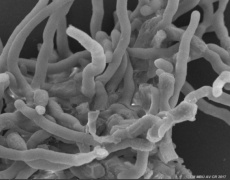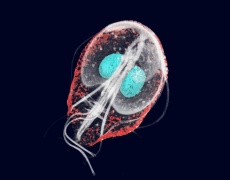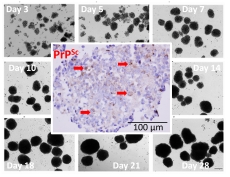Bacteriology Lab
Head of the Laboratory: doc. RNDr. Jan Bobek, Ph.D. (jan.bobek@lf1.cuni.cz, tel. +420 224 968 592).

We study cellular differentiation and secondary metabolite production in actinobacteria from the group of streptomycetes and related organisms. These bacteria are exceptional in their complex evolution and serve as a key source of bioactive compounds with antimicrobial, immunomodulatory, carcinostatic effects with high potential for human medicine. We focus on the systematic analysis of gene expression during developmental transitions, particularly pleiotropic regulation by sigma factors and small regulatory RNAs, with the aim of generating mutant strains with enhanced antibiotic production. In collaboration with the Institute of Soil Biology, Biology Center CAS, we are isolating new strains of autonomous or host-associated streptomycetes. In collaboration with clinical sites across the country, we are collecting and characterizing a unique collection of streptomycetes isolated from human clinical specimens to assess their pathogenic and bioactive potential. Testing of new production strains allows us to discover new compounds effective against resistant microorganisms, with anti-inflammatory effect or promising candidates for biotechnological applications and production of modified and hybrid metabolites. We are also collaborating on the development of processes for the biodegradation of macrolide antibiotic residues in wastewater and soil using specialized streptomycete isolates to help reduce the environmental burden and prevent the rise of macrolide resistance in pathogenic bacteria.
Website of the research group: https://bacterlab.lf1.cuni.cz/en
Helmintology Lab
Head of the Laboratory: prof. RNDr. Libuše Kolářová, CSc. (libuse.kolarova@lf1.cuni.cz, tel. +420 224 968 459).
The basic research of our group is focused on the study of interactions between helminths and hosts, which may cause harm, but on the other hand, may also contribute to modify their immune response to fight other serious diseases. The involvement of selected helminth species in disease induction is being studied in animal models, but thanks to collaboration with medical institutions, also in human patients. The research is mainly focused on the study of the pathogenesis of selected helminth infections and on the immune response in hosts with different immune backgrounds, not least on new therapeutic options for parasite-induced infections. Our main focus is to investigate the impact of Toxocara spp. infection on the immune system of the paratenic host, especially with regard to autoimmune diseases. In laboratory animals we are working with a model of induced experimental autoimmune encephalomyelitis, which is used as a suitable alternative for the study of multiple sclerosis. The study of Schistosomatidae is focused on the possibility of assessing the risk of spreading schistosomiasis in endemic areas and on evaluating the effect of newly proposed anti-schistosomal agents in collaboration with foreign institutions. Applied research mainly deals with the aetiology of autochthonous and newly emerging helminthiasis in our territory (e.g. alveolar echinococcosis and dirofilariosis). An integral part of this activity is the study of the epidemiological aspects of these and other (toxocariasis) infections, especially the risks of infection by parasites, and the development of new diagnostic methods leading to the detection of infectious agents.
Website of the research group: https://helmintlab.lf1.cuni.cz/en
Laboratory of parasitic protozoa – GiardiaLab
Head of the Laboratory: RNDr. Pavla Tůmová, Ph.D. (pavla.tumova@lf1.cuni.cz, tel. +420 224 968 465).

Our laboratory has a long tradition. Previously, it was part of the Infectious Diseases Clinic of the Na Bulovce University Hospital and operated as an NRL for the diagnosis of tropical parasitic infections (headed by Dr. Eva Nohýnková). We conduct research on the causative agents of a number of protozoan infections and for some of them we also act as a consulting centre for medical institutions. In recent years, our main model organism is Giardia intestinalis. This human intestinal parasite is the most common causative agent of diarrhoeal diseases of parasitic origin. It causes up to 200 million acute and chronic cases of giardiasis each year. Since its first description in 1859 by the physician Dusan Lamble, its research has been associated with our faculty. Our research group contributes to the understanding of the structural and functional arrangement of the cytoskeleton, the cell cycle and the genome organization of this binucleate parasite. We are working on the molecular epidemiology of Giardia and identifying mechanisms and markers of resistance to drugs, especially metronidazole. We use and develop multiomics approaches as well as advanced microscopic and molecular techniques. We value numerous international and national collaborations and are involved in mentoring MSc and PhD students.
Website of the research group: https://giardialab.lf1.cuni.cz/
Prion Laboratory – PrionLab
Head of the Laboratory: prof. Ing. Karel Holada, Ph.D. (karel.holada@lf1.cuni.cz, tel: +420 224 968 503).

Research in the prion laboratory is primarily focused on studying the pathogenesis of prion infections and developing new inactivation and diagnostic techniques for infectious prion particles. The unusual structure and replication mechanism distinguish prions from other infectious agents. Prions are resistant to many standard sterilization and disinfection procedures. The absence of an antibody response and a specific genome complicates their diagnosis.To study the pathogenesis of prion infection, we have developed a model using 3D differentiated cultures of CAD5 spheroids. This model will be used to study the course of infection in non-dividing cells and to test the efficacy of newly developed anti-prion drugs. In the area of decontamination, we have described an original method of photodynamic prion inactivation using phthalocyanine derivatives. This method could become a standard component of sterilization procedures. We are the only laboratory in our country to have implemented the ultrasensitive detection method for prions known as the “Real Time Quaking-Induced Conversion (RT-QuIC) assay” and verified its diagnostic reliability. Our goal is to have this method included among the insurance-covered diagnostic tests. Moreover, we aim to use its principle to develop RT-QuIC tests for other "prion-like" diseases, such as Alzheimer’s and Parkinson’s disease.
Website of the research group: http://www.prionlab.cz/en
Virology Lab
Head of the Laboratory: Zora Mělková, MD, PhD (zora.melkova@lf1.cuni.cz, tel. +420 224 968 507).
The focus of the Virology lab research consists in the studies of interactions of viruses with the host. We have an extensive experience with poxviruses, specifically vaccinia virus, the smallpox vaccine. Lately, we have been exploring the role of redox stress, induced namely by heme arginate (Normosang) and disulfiram (Antabus), in HIV-1 latency reversal and cure. We are also studying antiviral and immune-modulating properties of heme arginate and other agents active against SARS-CoV-2. Education of postgraduate and magister students and the support of the work on their theses constitute an inherent part of the lab focus.
Website of the research group: https://nolab.lf1.cuni.cz/en